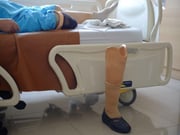By Cara Murez HealthDay Reporter

THURSDAY, April 20, 2023 (HealthDay News) -- Patients with a common vascular disease that causes blockages in their leg vessels had both worse symptoms and outcomes if they were Black or poor, new research finds.
The study from Michigan Medicine looked at more than 7,000 patients with peripheral arterial disease (PAD) who had a lower extremity bypass operation to improve circulation. PAD involves plaque blocking the vessels that carry blood from the heart to the legs.
The condition was particularly disabling for Black and poor patients, who had a higher prevalence of chronic limb-threatening ischemia (inadequate blood supply), the most severe form of PAD. In these cases, amputation is often required.
In fact, the researchers discovered that these patients were more likely to need an amputation between 30 days and up to one year after bypass surgery than white patients and those who were not socioeconomically disadvantaged.
“While we have known that racial and socioeconomic disparities exist for patients with PAD, our study may be the first to show that the severe presentation of these patient populations serves as a mediator to poor outcomes after lower extremity bypass, particularly amputation rates,” said lead study author Dr. Chloé Powell, a vascular surgery resident at the University of Michigan Health Frankel Cardiovascular Center in Ann Arbor.
“Health care providers need to recognize the vulnerability of certain subgroups to adverse outcomes and be on alert for early signs and symptoms of PAD, to manage patients accordingly," Powell added in a university news release.
More than 8.5 million Americans have PAD, about 10% of them with conditions that progress from lack of blood flow causing pain with activity to chronic limb-threatening ischemia.
Researchers found that disease accounted for up to half the effect of race on odds for amputation after a bypass, but Black patients had increased odds of amputation one year after the procedure even in the absence of severe disease. This requires further study, the authors said.
The findings, which were funded partly by the U.S. National Institute on Aging, were published April 13 in the Annals of Surgery.
“The observed disparities in surgical outcomes and advanced presentation are ultimately downstream manifestations of historical and contemporary structural inequities and the policies that drive them,” said senior study author Dr. Peter Henke, director of the University of Michigan Health Frankel Cardiovascular Center.
More information
The U.S. Centers for Disease Control and Prevention has more on peripheral arterial disease.
SOURCE: Michigan Medicine, news release, April 19, 2023
Back

The news stories provided in Health News and our Health-E News Newsletter are a service of the nationally syndicated HealthDay® news and information company. Stories refer to national trends and breaking health news, and are not necessarily indicative of or always supported by our facility and providers. This information is provided for informational and educational purposes only, and is not intended to be a substitute for medical advice, diagnosis, or treatment.






